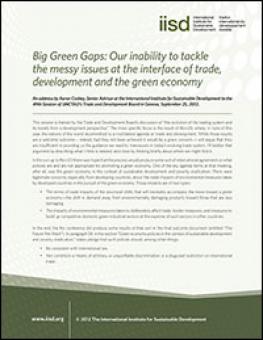
Big Green Gaps: Our inability to tackle the messy issues at the interface of trade, development and the green economy
This address to UNCTAD's 49th Trade and Development Board explores what Rio + 20 failed to do: move us toward international consensus on what is appropriate state behaviour in the pursuit of a green economy.
We have a panoply of unilateral measures employed to capture both environmental and industrial policy-type benefits—from renewable energy subsidies to aviation levies—but little consensus on their propriety. Some are clearly WTO-illegal, some are not, and others occupy a legal grey area. But more important than legality is the question: can they actually be effective both environmentally (in disseminating more green technology) and economically (in fostering mature new entrants and innovators in the green tech space)? And how do we balance any global environmental benefits against the impacts on trading partners? Such questions cannot be answered in the WTO, and are caustic to the WTO's dispute settlement mechanism. But we have no other suitable venues for discussion.
Participating experts
You might also be interested in
Agreement on Climate Change, Trade and Sustainability: A landmark pact for trade and sustainability
The ACCTS pact, signed by Costa Rica, Iceland, New Zealand, and Switzerland, aligns trade and environmental policies, tackling fossil fuel subsidies, eco-labels, and green trade.
Addressing Carbon Leakage: A toolkit
As countries adopt ambitious climate policies, this toolkit examines strategies to prevent carbon leakage—when production and emissions shift to nations with weaker climate policies—and explores the trade-offs of each approach.
IISD Trade and Sustainability Review, December 2024
This edition of the IISD Trade and Sustainability Review presents four expert perspectives on how agricultural support and subsidies can promote sustainability in developing and least developed countries.
Why Trade Matters in the Plastic–Pollution Treaty Negotiations
The global push to end plastic pollution by 2040 highlights the critical intersection of trade and environmental action, with upcoming INC-5 negotiations focusing on reducing plastic production, consumption, and waste within a fair and effective international framework.